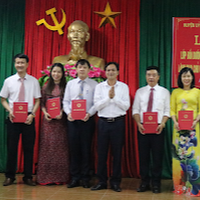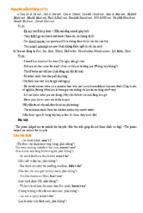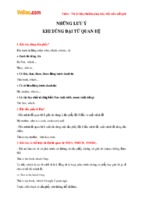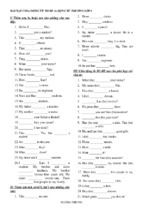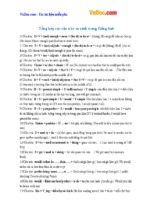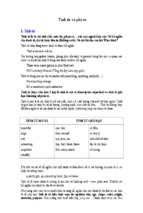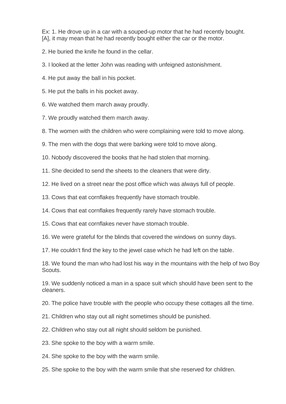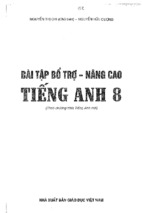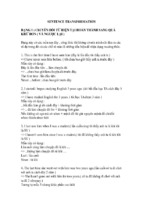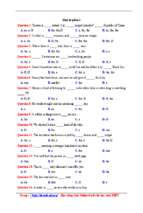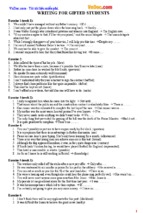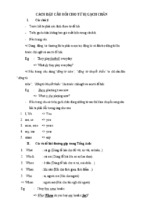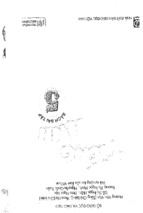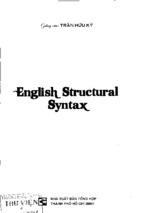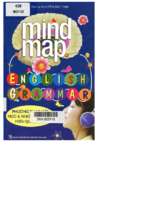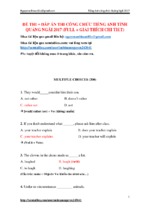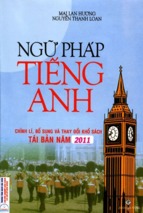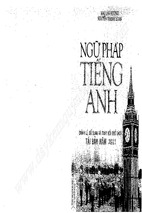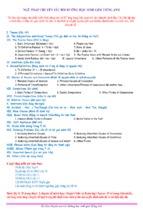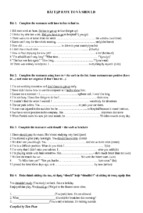Chuyên đề 3: REPORTED SPEECH
* Những trường hợp không thay đổi thì của động từ:
a. Khi động từ tường thuật ở thì hiện tại đơn, hiện tại hoàn thành hoặc tương lai:
Ex: She says to me: "I like classical music".
→ She tells me she likes classical music.
b. Nếu câu trực tiếp là câu điều kiện loại 2 và loại 3
Ex: "If the weather were fine, we could go camping", Peter said.
→ Peter said if the weather were fine, they could go camping.
c. Nếu trong câu trực tiếp có các trợ động từ: should, would, could, ought to, might, used to, had
better..
Ex: "You should practice speaking English every day" the teacher said to Mai.
→ The teacher said that Mai should practice speaking English every day.
d. Thì quá khứ giả định (past subjunctive) vẫn giữ nguyên sau: (I) wish ..., would rather ..., It’s
time...
Ex: She said “I wish I had a lot of books.”
→ She told me she wished she had a lot of books.
e. Thì hiện tại đơn diễn tả 1 sự thật hiển nhiên, 1 chân lí
Ex: She said " Water boils at 100 degrees Celsius."
→ She said that water boils at 100 degrees Celsius.
* Nếu động từ của mệnh đề tường thuật dùng ở thì quá khứ thì khi chuyển sang câu gián tiếp ta
đổi ngôi, thì của động từ, trạng từ chỉ thời gian và nơi chốn.
I. Thay đổi ngôi (Đại từ nhân xưng, Đại từ sở hữu và Tính từ sở hữu)
1. Ngôi thứ nhất: dựa vào chủ từ( người nói) của mệnh đề tường thuật; thường đổi sang ngôi thứ ba
I → He / She
me → him / her
my → his / her
We → They
us → them
our → their
Ex: He said: “I learned English.”
He said that he----------------------------- English.
Ex: She said to me, “My mother gives me a present.”
She told me that her mother---------------------------------------2. Ngôi thứ hai: (You, your)
- Xét ý nghĩa của câu và đổi cho phù hợp, thường đổi dựa vào ngôi của người nghe trong mệnh đề
tường thuật
Ex: Mary said to me : “You are late again.”
Mary said that I were late again.
Ex: “I will meet you at the airport”, he said to me.
He told me that he would meet me at the airport.
3. Ngôi thứ ba (He / She / Him / Her / His / They / Them / Their): giữ nguyên, không đổi
II. Thay đổi về thì trong câu:
DIRECT
INDIRECT
Simple present - V1 /Vs(es)
Simple past – V2 / V-ed
Present progressive – am / is / are + V-ing
Past progressive – was / were + V-ing
Present perfect – have / has + P.P
Past perfect – had + P.P
Present perfect progressive – have / has been +V-ing Past perfect progressive - had been + V-ing
Simple past – V2 / -ed
Simple past – V2 / V-ed /Past perfect – had + P.P
Past progressive – was / were + V-ing
Past perfect progressive – had been +V-ing
Simple future – will + V1
Future in the past - would + V1
Future progressive will be + V-ing
Future progressive in the past - would be + V-ing
1
III. Thay đổi các trạng từ chỉ thời gian và nơi chốn:
CÂU TRỰC TIẾP
Will / shall + bare inf
Must + bare inf
CÂU TƯỜNG THUẬT
Would / should + bare inf
Had to + bare inf( chỉ chuyển khi có nghĩa là
bổn phận phải làm gì. Còn trong các trường hợp
khác vãn giữ nguyên Must)
Is / am/ are going to
Was / were going to
Can / May
Could / Might
This / these
That / those
Now
Then
Here
There
Ago
Before
The day after tomorrow
In 2 days' time
The day before yesterday
2 days before
Today / tonight
That day / that night
Tomorrow
The day after / the following day / the next day
Yesterday
The day before / the previous day
Last night / month / week / year
The night / month / week / year before.
* mustn’t (cấm đoán) → mustn’t / couldn’t :
→ The guard said we mustn’t / couldn’t cross the border.
* needn’t → didn’t have to, needn’t.
→ The boss said that I needn’t/ didn’t have to come in the next day.
* shall (future) → would : “ I shall tell him exactly what I think,” she said
→ She said she would tell him exactly what she thought.
* shall ( offers, suggestions, requests for advice) → should:
- “ Shall I speak to him in person?”, she asked.→ She asked whether she should speak to him in
person.
CÁC THAY ĐỔI CỤ THỂ CHO TỪNG LOẠI CÂU TRONG LỜI NÓI GIÁN TIẾP
1. COMMANDS / REQUESTS (Câu mệnh lệnh, câu đề nghị)
- Mệnh lệnh khẳng định:
Direct:
S + V + O: “V1 + O …”
Indirect:
S + asked / told + O + to + V1 + ….
Ex: He said to her: “Keep silent, please.” → He told her to keep silent.
“Wash your hands before having dinner, Lan.” The mother said.
→ The mother told Lan to wash her hands before having dinner.
- Mệnh lệnh phủ định:
Direct:
S + V + O: “Don’t + V1 + …”
Indirect:
S + asked / told + O + not + to+ V1 ….
Ex: “Don’t forget to phone me this afternoon,” he said.
→ He reminded me to phone him that afternoon.
The teacher said to the students: “Don’t talk in the class.”
→ The teacher asked the students not to talk in the class
* Tùy theo ngữ cảnh trong lời nói động từ tường thuật said to có thể đổi thành told, asked,
advised, persuaded, directed, begged, encouraged, warned,ordered, urged, invited …
Ex: The doctor said to his patient: “Do exercise regularly.”
2
→ The doctor advised his patient to do exercise regularly.
2. STATEMENT (Câu trần thuật)
Direct:
S + V + (O) : “clause”
Indirect:
S + told / said + (O) + (that) + clause
Note: said to → told ( sử dụng told khi có sb theo sau)
Ex: Tom said, “I want to visit my friend this weekend.”
→ Tom said (that) -----------------------------------------------------------------------She said to me, “I am going to Dalat next summer.”
→ She told me (that) ------------------------------------------------------------------3. QUESTIONS (Câu hỏi)
3.1. Yes- No question:
asked O
S + wondered
IF/WHETHER S +V (ch) + ( O/C/A)
wanted to know
IF/ WHETHER: (liệu có hay không.)
Ex 1. He asked me," Do you like these trousers?" - He asked me if I liked those trousers.
Ex 2. "Will you go to school next Sunday, Jack?" asked Mary.
- Mary asked Jack whether he would go to school the next Sunday.
Notes:
a. Yes and No ( trong câu trực tiếp)
Ex:
He said, 'Can you swim?' and I said 'No' .
→ He asked (me) if I could swim and I said I couldn't.
Ex:
He said, 'Will you have time to do it?' and I said 'Yes'
→ He asked if I would have time to do it and I said that I would.
b. Các dạng hỗn hợp của lời nói gián tiếp:
Ex: " I don't knowthe way. Do you" he asked.
→ He said he didn't know the way and asked me if I did/knew it.
( Mỗi kiểu câu sẽ sử dụng một động từ tường thuật riêng)
c. whether ( dùng trong trường hợp lựa chọn)
Ex:
'Do you want to go by air or sea" the travel agent asked
→ The travel agent asked whether I wanted to go by air or by sea.
* Note whether or not:
'Do you want to insure your luggage or not?”, he asked
→ He asked whether or not I wanted to insure my luggage .
→ He asked whether I wanted to insure my luggage or not.
d. whether + to V(inf) trong trường hợp wonder, want to know:
Ex:
'Shall/Should I wait for them or go on?”, he wondered.
→ He wondered whether to wait for them or go on
→ He wondered whether he should wait for them or go on.
e. whether được sử dụng khi câu trực tiếp là một câu hỏi ở dạng câu điều kiện có If để tránh
trường hợp hai chữ If cùng chỗ.
Ex:
'If you get the job will you move to York?' Bill asked
→ Bill asked whether, if I got the job, I'd move to York.
3.2. Wh- questions:
asked O
S + wondered
wh- / how- S +V (ch) + ( O/C/A)
wanted to know
1. "Where did you go yesterday?" → I asked her where she had gone the day before.
3
2. They asked ," How can you repair this machine, John?"
→ They asked John how he could repair that machine.
3."Why did the dog bark violently last night, Daisy?", asked Tom.
→ Tom asked Daisy why the dog had barked violently the night.
4. EXCLAMATION:
4.1.
S + exclaimed / said / told (O) that + S + V (ch.) + (O/C/A)
He said, “ What a dreadful idea!” or “ How dreadful!”
→ He exclaimed/ said that it was a dreadful idea/ was dreadful.
4.2.
S + exclaimed/ said / told (O) + what (a/an) adj N (s) + S + V(ch.)
+ how adj/ adv. + S + V (ch.)
He said, “ What a dreadful idea!” or “ How dreadful!”
→ He said that what a dreadful idea it was/ how dreadful it was. ( Anh ta thốt lên rằng....)
4.3.
S + gave an exclamation of delight/ disgust/ horror/ relief/ surprise…
“ Good.”, he exclaimed. → He gave an exclamation of pleasure/ satisfaction. ( Anh ta
thốt lên với một sự.....)
4.4.
With an exclamation of delight ( thích thú)/ disgust ( phẫn nộ)/ horror …, S + V + .....
“ Ugh!”, she exclaimed and turned the programme off.
→ With an exclamation of disgust, she turned the programme off .(Với một lời tỏ vẻ ghê tởm....)
NOTES:
a. Other types of exclamation, such as Good!/ Marvellous! (Tuyệt!)/ Splendid!(Hết sẩy!)
Heavens!( Trời ơi!)/ Oh!(O!)/ Uah!(ghê quá!) etc. can be reported as, in (4.3) or (4.4) above:
b. Note also:
He said, 'Thank you!'
= He thanked me.
He said, 'Curse this fog!'
= He cursed the fog.( nguyền rủa, chửi rủa)
He said, 'Good luck!'
= He wished me luck.
He said, 'Happy Christmas!'
= He wished me a happy Christmas.
He said, 'Congratulations!'
= He congratulated me.
He said, 'Liar!'
= He called me a liar.
He said, 'Damn!'etc.
= He swore.
The notice said: WELCOME TO WALES'. =The notice welcomed visitors to Wales.
NOTES:
1. Had better : She said to Jason,” You’d better arrive on time,”
→ She said that Jason had better arrive on time.
→ She advised Jason to arrive on time
2. “ If I were you…” : “ If I were you, I should get another lawyer.”, she said.
→ She said that if she were me, she would get another lawyer. (LM, p.291)
→ She advised me to get another lawyer.
→ She told me that I should get another lawyer.
3. “ What about…?” → suggest :
“ What about go camping?”, he continued.
→ He suggested going camping.
4. “ Why don’t you…?” → suggest / advise : She asked, “ Why don’t you visit Jane?”
→ She suggested that I (should) visit Jane.
→ She suggested my visiting Jane
4
→ She advised me to visit Jane.
5. “ Will…you?”/ Would…you?” / “ Could… you?” → “ say that…be + to inf.”/ “ suggest.
that….(should) V…” / “ order that…” / “ order SO to do sth”…
“ Will you stop talking?”, said the teacher.
→ The teacher ordered(told) them to stop talking.
→ The teacher said that they were to stop talking.
→ The teacher suggested that they (should) stop talking.
6. “ Would you mind + Ving…?” → ask … to inf / ask if….would mind + V-ing.
“ Would you mind opening the window?”, said Jason to the boy.
→ Jason asked the boy to open the window.
→ Jason asked the boy if he would mind opening the window.
7. “ Let’s….” → suggest + V-ing / suggest that….shoul + V …
Marie said to her friends, “ Let’s wait here.”
→ Marie suggested their waiting there.
→ Marie suggested that they should wait there.
8.“ Let + O + V …” → ask….to let….
“ Let me go”, said Jason to his principal teacher.
→ Jason asked his principal teacher to let him go.
* Some famous verbs that are used to report command& request
1. advise SO (not) to do sth: (khuyen ai nen lam/ khong nen lam viec gi)
* The doctor advised the patient to take those pills.
* Teacher usually advises his/her students not to smoke.
2. apologize (to SO) for doing/ having done sth: ( xin loi ai vì da lam gi)
* She apologized (to her boss) for being late yesterday.
3. ask/ tell sO (not) to do sth: ( yeu cau, sai, bao ai lam/ khong lam gi)
* My parents asked me to study hard.
* Jason told us (not) to shut the door.
4. command/ order sO to do sth: ( ra lenh cho ai phai lam gi)
* The officer commanded/ ordered his men to fire.
5. object to (doing) sth: ( phan doi (lam) viec gi)
* I strongly objected to being charged a fee for using my credit card.
Object + that : I objected that he was too young for the job.
6. request sO to do sth: (yeu cau ai lam gì) – be requested to do sth : (duoc yeu cau lam gi)
* The police requested drivers to take care on the icy road.
( Drivers were requested to take care on the icy road.)
7. suggest : goi y/ de nghi
Suggest + V-ing: - He suggested taking the children to the zoo.
Suggest + that : - I suggested that we (should) break for lunch now.
Suggest (to Sb) that: - I suggested to the others that they could join us.
8. remind sb to do sth: ( nhac ai laøm gi)
* Please remind me to buy a loaf of bread.
9. deny doing sth/ deny that : phu nhan, khong thua nhan (da lamgi).
* She denied knowing anything about it.
* He denied that he had been involved.
10. accuse sb of (doing) sth: ( len an ai da lam gi)
* The policeman accused the boy of stealing the bicycle.
* Jason accused his neighbor of thief
11. regret: hoi han/ hoi tiec:
- regret + V-ing : - I regretted (his) ever raising the matter.
5
- regret + that : - I regret that I cannot help.
- regret + to inf. : We regret to inform you that your applications have been unsuccessful.
12. allow/ permit sb to do sth: cho phep ai lam gi
13. beg(ged) sb to do sth: cau xin ai lam gi.
14. urge sb to do sth: thuc giuc ai lam gi ……
* Reporting Verb + (Someone) + Preposition + V-ing + ….
- thank someone for
(cám ơn ai về ….)
- accuse someone of
(buộc tội ai về …)
- congratulate someone on (chúc mừng ai về ….)
- warn sb of st : báo trước / cảnh báo ai
- warn someone against /about sb(st) doing st:
(dặn ai đề phòng ai/cái gì….)
- dream of
(mơ về …)
- object to
(chống đối về ….)
- apologize to someone for st/doing st
(xin lỗi ai về …)
- insist on doing st :
(khăng khăng dòi …)
- complain about st/doing st : (phàn nàn về ….)
* ĐỘNG TỪ NGUYÊN MẪU (TO-INFINITIVE) TRONG LỜI NÓI GIÁN TIẾP
Khi lời nói gián tiếp là một lời đề nghị, mệnh lệnh, ý định, lời hứa, lời yêu cầu, …động từ tường
thuật cùng với động từ nguyên mẫu theo sau nó thường được dùng để chuyển tải nội dung lời nói này.
a. Reporting Verb + To-Vinf …
- agree
demand (đòi hỏi)
guarantee (bảo đảm)
- hope
promise
swear (thề)
- threaten (đe dọa)
volunteer
offer (đưa ra đề nghị)
- refuse
consent (bằng lòng)
decide
Ex: “I will give you my book if you need it,” said my friend.
→ My friend offered to give me her book if I needed it.
b. Reporting Verb + Object + To-Vinf …
- ask
advise
command (ra lệnh)
- expect
instruct (hướng dẫn)
invite
- order (ra lệnh)
persuade (thuyết phục)
recommend (khuyên)
- remind (nhắc nhở)
encourage (cổ vũ)
tell
- urge (thúc giục)
warn (cảnh báo)
want
Ex: “Don’t forget to lock the door,” I said to my sister.
→ I reminded my sister to lock the door.
Ann said: “Come to my place whenever you are free.”
→ Ann invited me to come to her place whenever I was free.
c. CÂU ĐIỀU KIỆN TRONG LỜI NÓI GIÁN TIẾP
Nếu trong lời nói trực tiếp có câu điều kiện thì chỉ có câu điều kiện loại 1 là thay đổi về thì, câu
điều kiện loại 2 và 3 vẫn giữ nguyên hình thức động từ của chúng.
Ex: “If I have time, I will visit her,” he said.
→ He said that if he had time he would visit her.
She said: “If I had enough money, I would buy a car.”
→ She said that if she had enough money she would buy a car.
He said to me : “If I had met you, I would have told you the truth.”
→ He told me that if he had met me he would have told me the truth.
EXERCISES:
6
I. (REPORTED SPEECH: STATEMENTS)
1. Nam said “I am told to be at school before 7 o’clock”.
…………………………………………………………………………….
2. Thu said “All the students will have a meeting next week”.
…………………………………………………………………………….
3. Phong said “My parents are very proud of my good marks”.
…………………………………………………………………………….
4. The teacher said “All the homework must be done carefully”.
…………………………………………………………………………….
5. Her father said to her “You can go to the movie with your friend”.
…………………………………………………………………………….
6. Hoa said “I may visit my parents in the summer”.
…………………………………………………………………………….
7. The teacher said “We can collect old books for the poor students”.
…………………………………………………………………………….
8. She said “He doesn’t buy this book”.
…………………………………………………………………………….
9. The boys said “We have to try our best to win the match”.
…………………………………………………………………………….
10. Her classmate said “Lan is the most intelligent girl in our class”.
…………………………………………………………………………….
II. (REPORTED SPEECH: YES/NO QUESTIONS)
1. “Do you enjoy reading?” Phong asked Peter
…………………………………………………………………………….
2. “Does she like sports?” Hoa asked Lan
…………………………………………………………………………….
3. “Do your sister and brother go to the same school?” She asked Nam
…………………………………………………………………………….
4. “Are there any oranges in the fridge?” She asked her mom
…………………………………………………………………………….
5. “Will it rain tomorrow morning?” He asked his friend
…………………………………………………………………………….
6. “Did you go to Hue three years ago?” Tam asked Peter
…………………………………………………………………………….
7. “Are Tam and Hoa late for class?” Tuan asked Lan
…………………………………………………………………………….
8. She said to me “Can you speak Chinese?”
…………………………………………………………………………….
9. “Will she be here for five days?” Tam asked Thu
…………………………………………………………………………….
10. “Are you reading now?” She asked Ba
…………………………………………………………………………….
III.(REPORTED SPEECH: WH-QUESTIONS)
1. “Where does your father work?” The teacher asked me
…………………………………………………………………………….
2. “How many people are there in your family?” She asked Lan
…………………………………………………………………………….
3. Tam’s friend asked him “How long will you stay in England?”
…………………………………………………………………………….
7
4. "Where have you been?" the mother asked her daughter.
…………………………………………………………………………….
5. Lien said to her teacher “What can we do to help him?”
…………………………………………………………………………….
6. “How did you go to the airport?” His friend asked him
…………………………………………………………………………….
7. “How much does this dress cost?” Lan asked Lien
…………………………………………………………………………….
8. Ba asked Tam “How often do you wash your clothes?”
…………………………………………………………………………….
9. “When will your father leave Vietnam for the USA?” Phong asked Thu
…………………………………………………………………………….
10. “What are our children doing in the room ?”Mr. Nguyen asked his wife.
…………………………………………………………………………….
IV.(REPORTED SPEECH: IMPERATIVES)
1/ The manager said : “ Come into my office, please.”
…………………………………………………………………………….
2/ The teacher said to us : “Don’t make so much noise.”
…………………………………………………………………………….
3/ Mr.Green said : “Please come to our dinner tonight, Bill.”
…………………………………………………………………………….
4/ Susan said to Tom : “Don’t call me again at this late hour.”
…………………………………………………………………………….
5/ She said to the boy : “Show me what you have in your hand.”
…………………………………………………………………………….
6/ The policeman ordered : “Stay where you are and don’t touch anything.”
…………………………………………………………………………….
7/ The old lady said : “Will you please water these flowers for me.”
…………………………………………………………………………….
8/ She said : “Don’t leave your coat on this chair.”
…………………………………………………………………………….
9/ She said to him : “Don’t speak to me like that and behave yourself.”
…………………………………………………………………………….
10/ Peter said : “Would you mind lending me your dictionary till next Monday.”
…………………………………………………………………………….
11. “ Good.” he exclaimed .
→....................................................................................................
12. "Marvellous!" she shouted. →....................................................................................................
13. " Heavens!" he exclaimed.
→...................................................................................................
V.Choose the best option that best completes each sentence:
1/. Ba told me that he was leaving for the capital _____________.
A. tomorrow
B. the following week
C. tonight
D. next Sunday
2/. They asked me how many children_______________ .
A. I had
B. had I
C. I have
D. have I
3/. Thu said she had been_____________ the day before.
A. here
B. there
C. in this place
D. where
4/. They told their parents that they______________ their best to do the test.
A. try
B. will try
C. are trying
D. would try
5/. She______________ me whether I liked classical music or not.
8
A. ask
B. asks
C. asked
D. asking
6/. He asked me who the editor of that book____________ .
A. was
B. were
C. is
D. has been
7/. He wants to know whether I_____________ back tomorrow.
A. come
B. came
C. will come
D. would come
8/. I wonder why he______________ love his family.
A. doesn’t
B. don’t
C. didn’t
D. hasn’t
9/ “I didn’t witness that accident.”
A. He denied not having witnessed that accident.
B. He denied having witnessed that accident.
C. He denied not having witnessing that accident.
D. He denied not had witnessed that accident.
10/ “Would you like to join our team?”, he said.
A. He said to me would you like to join our team.
B. He told me if I would like to join their team.
C. He invited me to join their team.
D. He asked me if I would like to join our
team
11/ “You cheated in the exam.” The teacher said to his students
A. The teacher insisted his students on cheating in the exam.
B. The teacher prevented his students from cheating in the exam.
C. The teacher advised his students to cheat in the exam.
D. The teacher accused his students of cheating in the exam.
12/ “Don’t touch that flower.” the old lady said to the boy.
A. The old lady wanted the boy not to touching that flower.
B. The old lady insisted the boy on touching that flower.
C. The old lady warned the boy against touching that flower.
D. The old lady congratulated the boy on touching that flower.
13/ “Let’s go on a walk holiday!” said Jane.
A. Jane suggested going on a walking holiday.
B. Jane wanted us to go on a walking
holiday.
C. Jane invited us to go on a walking holiday. D. Jane allowed us to go on a walking holiday.
14/ " Don't forget to give the book back to Mary," he said to me.
A. He reminded me to give the book back to Mary.
B. He reminded me to forget to give the book back to Mary.
C. He advised me to give the book back to Mary.
D. He advised me to forget to give the book back to Mary.
15/“If I were you, I would take the job”, said my friend.
A. My friend was thinking about taking the job. B. My friend insisted on taking the job for me.
C. My friend advised me to take the job.
D. My friend introduced the idea of taking the job to me.
VI.
1 Tom said to the girl: "When did you have this picture taken?"
2 "Shall we go somewhere for a cup of coffee after class?" Tom said.
3 John said to Mary, "Why don't you wear your hair a little longer."
4 "Would you like another cup of tea?" the landlady said to the guest.
5 My sister said to me, "What about going to see Aunt Mary on Sunday?"
6 She asked me, "Have you ever seen a flying saucer?"
7 James said: "Do you want me to type this letter for you?"
8 Alfred said to John, "I didn't use your cassette player! Someone else did, not me."
9 Father said, "I was the superintendent while this school was being built."
10 The woman said, "If I had a gas stove, it would save me a lot of time."
VII.
1 Jane said to Bill, “When do you expect to finish your assignment?"
9
2 The man said to the boy: "Can you show me the way to the bank?"
3 Fred asked the postman: "Are there any letters for me today?"
4 Henry said to the librarian, "How many books can I borrow at a time?"
5 John asked his friend, "How did you manage to know my phone number?"
6 “These old buildings might have already disappeared by the time I am back next year?" he said
7 The boys said to the old woman: "What can we do to help you?"
8 The guests said to the doorman: "Where should we leave our coats?"
9 Tom asked his brother: "Why did you advise them to go sight-seeing on foot?"
10 I asked the children: "Who took away the magazines from my desk?"
VIII.
1 Rose said, "I was just leaving the office when I came face to face with a stranger."
2 Ann asked her brother, "Do you expect to be admitted to the univer¬sity?"
3 Richard asked Jane, "What are you planning to do tomorrow?"
4 She asked her boy friend "Is it true that your father fought in the last war?"
5 Jane said to me, "Where have you been all this time?"
6 Mary said to her husband, "Did you see my handbag anywhere?"
7 The inspector said to the woman, "What were you doing at 7 o'clock yesterday evening?"
8 The passenger said to the taxi-driver: "Hurry up!" and he added "I must be at the station on time."
9 Tom said to himself: "Why I haven't thought of this before?"
10 Father said: "The taxi is coming now. Is everyone ready?"
IX.
1 Helen said, "I think I'll have to find a better job. I can't make both ends meet."
2 He said to her "Why are you so late? I've been waiting for half an hour already."
3 She said to him: "Don't let them down. I'll be very embarrassed if you go back on your words."
4 She said to her husband: "You'd better not drink top much. You may lose control of the car and have
a bad accident."
5 The boy said to his mother: "When shall we have lunch? I'm very hungry."
6 He said, "I don't understand why she has refused to join us on the trip."
7 She said to him, "I'm glad you've come. Sit down, please."
8 Mr Brown said to his wife, "I don't feel like going out this evening.”
Let's ask the Browns to come over for a chat."
9 “It's raining too hard to go out. We'd better stay home tonight and watch TV instead." John said.
10 "Could you ring up the station and find out when the train comes in?" said Tom to me.
X.
1 "Be careful. Don't go too near the edge of the cliff," she said to the boys.
2 "Please, please come to help me with the assignment," my friend said to me.
3 "I wouldn't buy that sort of raincoat if I were you," my friend said to me.
4 "Would you mind moving your bicycle?" said the janitor. "It's in the way."
5 "Could I take out another book, please," I said to the librarian.
6 "Remember to leave the window open when you're using the gas stove," my mother said to me.
7 "Wear your school badge or they won't let you into the classroom." my teacher said to me.
8 "Would you like to come over to my house for a slide show?" my
friend said to me.
9 "Show me your driver's licence, will you?" the policeman said to the drunken driver.
10 "Do come again next weekend," the host said to the visitor.
10
- Xem thêm -
